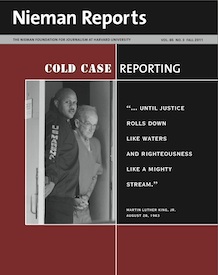Editor’s Note: Our sister publication Nieman Reports is out with their Fall 2011 issue, “Cold Case Reporting,” which focuses on process of revisiting old investigations to tell new stories. Over the next few days, we’ll highlight a few stories from the issue — but go read the whole thing. In this piece, Nicola Bruno, cofounder of effecinque and a fellow at the Reuters Institute for the Study of Journalism at Oxford, writes about new ways journalist are managing an increased flow of information.
At Northwestern University, out of a place bearing the name Intelligent Information Laboratory, rises the invisible hand of Stats Monkey, a software program capable, its creators say, of drafting dozens of news items in impeccable English within seconds. If it seems smarter than journalists perhaps this is because so far its stories have been limited to baseball, a sport in which statistics dominate. Number crunching is, after all, a mechanical task. Speaking of numbers, the folks who invented Stats Monkey say they plan to expand its coverage to global financial markets, a place where numbers scurry by in milliseconds. In this realm, the stories these numbers tell can make a significant difference — possibly sending markets tumbling with a misstep here or there.
 The escalating velocity and density of the flow of data mediates every aspect of our daily lives. Keeping this ferocity in mind, it is not difficult to understand why machines and robots — not human brains and people — face a promising future in journalism. Perhaps it is too much of a stretch for the Stats Monkey developers to predict that a story written by their program will be awarded a Pulitzer Prize within the next few years. With the pace of change so rapid, what might seem on its face an absurd notion can’t be totally dismissed.
The escalating velocity and density of the flow of data mediates every aspect of our daily lives. Keeping this ferocity in mind, it is not difficult to understand why machines and robots — not human brains and people — face a promising future in journalism. Perhaps it is too much of a stretch for the Stats Monkey developers to predict that a story written by their program will be awarded a Pulitzer Prize within the next few years. With the pace of change so rapid, what might seem on its face an absurd notion can’t be totally dismissed.
Our concern should not be solely a fear of robots replacing us. Journalists’ place in the world already is being reshaped by the widespread ability — belonging to anyone with a digital device — to effortlessly and inexpensively produce and disseminate information globally. Digital connectivity delivers us into unrelenting streams of social media that can drown us with their overflow of information. With digital media, government officials can — and do — bypass the pesky press by sending talking-point messages via Facebook or YouTube. Corporate interests and nonprofit organizations now rely on their own message-making strategies to deliver words about their missions and promote products and campaigns. And then there is the controversial public release of secrets by WikiLeaks and the potential this ease of revealing holds for other whistleblowers.